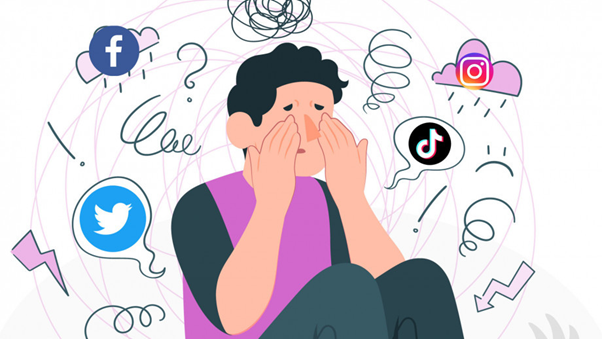While binge-watching the forever beloved TV sitcom ‘Friends’, a red circle represents the buffering platform when you tap on the next episode. We often see our reflection on the screen as loading happens, but do we, in reality, see the truest reflection of what we are doing? All of us just dive headfirst into the screen, losing ourselves in the tide.
We need our phones first thing in the morning, and they are the last thing our eyes see before they doze off to sleep. This is the average life of an individual in 2024. As a result of this unhealthy addiction, not only are we depriving our body of enough physical movement, but also our cognitive capacities are compromised. The phone is the medium for social media on the go, and this is taking a toll on many people’s mental health.
Social Media & Mental Wellbeing Are Friends or Foes: Finding Out
Social networking sites are a virtual place where all the people you know or are familiar with connect, and it is a kind of digital home for Gen Z. They spend hours on it mindlessly scrolling, uploading every mini detail of their day, liking posts, watching reel a playing word-wars in the comments.
Everybody thinks they have the freedom of speech and they are entitled to share their raw opinion like candies on the internet. However, this sometimes leads to cyberbullying and can cause anxiety, stress or sleep disruptions. Therefore, here are our two cents on the situation. We will discuss how it all began, how it is now, and how worse it can become in the forthcoming years if we fail to manage damage control.
Echoes of Yesterday – The Wistful History!
The roots of digital media date back to the late 1970s and early 1980s, when Bulletin Board System (BBS) and CompuServe were introduced to the world. The target market used these sites to share messages and files with anyone on their friend list. It was like Facebook before Facebook even came into the picture.
However, before the inception of social media platforms, people enjoyed the novelty of staying in touch with distant connections without the pressure of likes and followers. Life was simpler back then. Everybody would still share photos and use the ‘What’s on your mind?’ feature on Facebook. Hence, in the nostalgic past, we once cherished living in the moment and savouring genuine interactions in an intimate environment.
Now, all we do is relentlessly pursue views, and everything has become commercialised now. This means that social media has transformed from a space of authentic connections into a marketplace of curated personas and endless competition. Its original essence is nowhere to be found.
Current Realities – The Intensifying Present…
Whether you like it or not, the revolutionary media platforms, Facebook, Instagram, Snapchat, WhatsApp, Twitter, LinkedIn, YouTube and TikTok, are damaging our youth in a veil of digital connectedness. A prime example is how they use these websites to find an essay writing or medical thesis writing service.
These essential tools of communication are taking a toll on the mental health of young adults, and this is not good news. Teenagers and grown-ups in their early twenties are under pressure to maintain a perfect online persona, which is causing them to enter the initial stages of anxiety and depression.
Other than this, the viewers of such content are becoming victims of low self-esteem. They believe in the fake happy lives of content creators and feel deprived. Repercussions of this digital race are cyberbullying, online harassment, jealousy, hate comments and worsening mental health.
Visions of Tomorrow – The Future in Question!
When you scroll through the feed or read notifications of increasing views, likes and followers, the brain’s rewards center activates. It releases dopamine – the happy hormone, creating a sense of euphoria. The pleasure encourages the person to repeat the behaviour, driving them to seek more social validation online.
Hence, the addiction, but this is about to go crazier as the years pass by. The fine lines between online and offline experiences are expected to further blur, creating even more immersive and interactive community platforms. Soon, the students will become eager to find Nursing Essays and research help online, bidding farewell to learning.
Other than this, the increased screen time and dependency on virtual interactions might further isolate individuals from the real world. There will be fewer sports on the field and more on the screens.
The Desired & Must-Know Remedies!
Humans are clear addicts of society’s acceptance. When they do not find it, they become anxious. They feel irritated. They may even start questioning their self-worth and feel inadequate.
With time, this lack of societal affirmation can create a cycle of negative emotions, birthing a monster who can go to any limits to achieve praise from his or her virtual audience. In worst-case scenarios, things might lead to self-harm.
This means unsupervised social web usage can influence anybody’s mental health, resulting in severe disorders. Thus, we need to keep our digital and real lives discrete. Here are a few suggestions:
- There must be set time limits on apps to restrict daily screen time.
- Just like your body, you need to unfollow toxic and negative accounts from your feed.
- Only share uplifting and supportive content to build a healthier community.
- Make sure to take regular intervals away from the virtual world for digital detox.
- While you are on the break, you can opt for in-person interactions.
- Mindfully analyse your online habits and notice how they influence your behaviour.
- If you find something suspicious, consult a health professional as soon as possible.
- You can make space for hobbies, exercise and family time in your daily routine.
- Gain and spread awareness about digital literacy (responsible use of social media).
Q. Is deleting social media a good idea?
This action can have both advantages and disadvantages attached to it. On one hand, it will reduce stress, improve focus and enhance relationships. It might lead to feelings of isolation and FOMO or the fear of missing out.
Q. Why is TikTok so addictive?
People are glued to the TikTok app because of snippets, teasers, quick reads and infinite scrolling, which keeps the audience busy. Moreover, the dopamine rush a person gets from likes and shares is another cause of the addiction.
Q. How do social sites affect self-esteem?
When a person watches a richer or happier person on the gram, it is a human instinct to compare. They begin to notice what others have, and they do not. As a result, a person might become anxious, jealous or hateful, wanting to bully for self-validation.
Q. What changes are seen in behaviour because of media sites?
Community platforms are powerful enough to destroy a person’s mental health. It also affects behaviour by reducing attention spans, increasing the need for instant gratification and altering communication styles.
Summing Up How Social Media Affects Human Mind
As the years pass, humans are increasingly diving into the depths of virtual reality. Social media platforms are significant examples of this phenomenon. People engage so much in the sites that they cut their selves from the world.
You can blame the addictive features and characteristics of apps like Facebook, Instagram, TikTok etc. but deep down we all know that it takes two to tango. The dopamine discharge in the human system during scrolling is addictive and the brain eventually starts craving these hits. It seeks social validation through likes and comments (of strangers more than friends and family).
Therefore, you must run regular checks on your digital activity to avoid getting entranced by the internet and trapped in the social media cage!
Social media has profoundly transformed the landscape of human interaction, offering both connection and isolation. While it provides a platform for self-expression and community building, excessive use can lead to adverse mental health effects, such as anxiety, depression, and low self-esteem. The constant comparison to curated online personas can foster feelings of inadequacy, while cyberbullying and negative interactions contribute to emotional distress. Balancing social media engagement with real-world connections is essential for mitigating these impacts and promoting healthier mental well-being.






